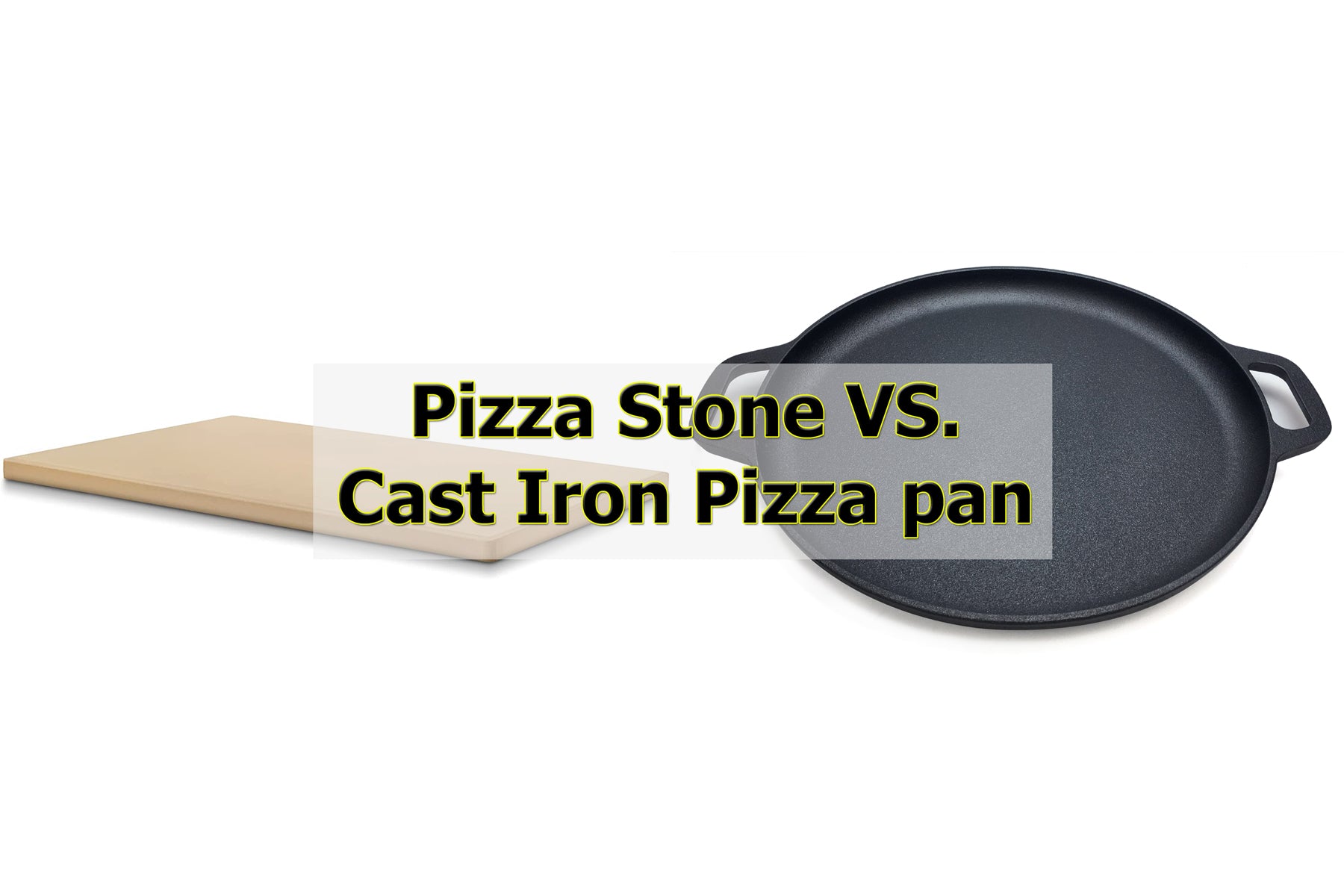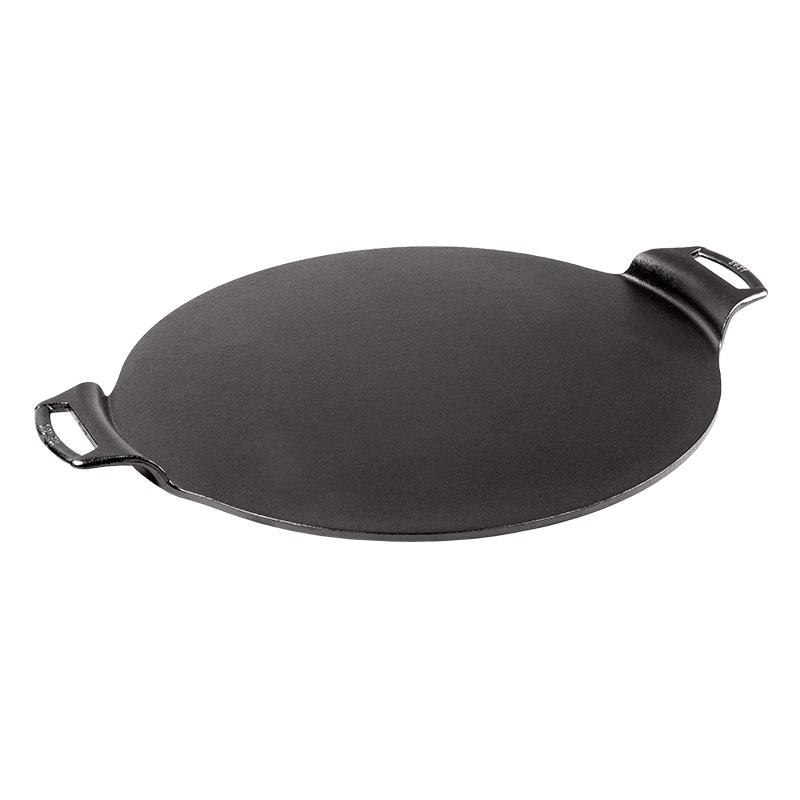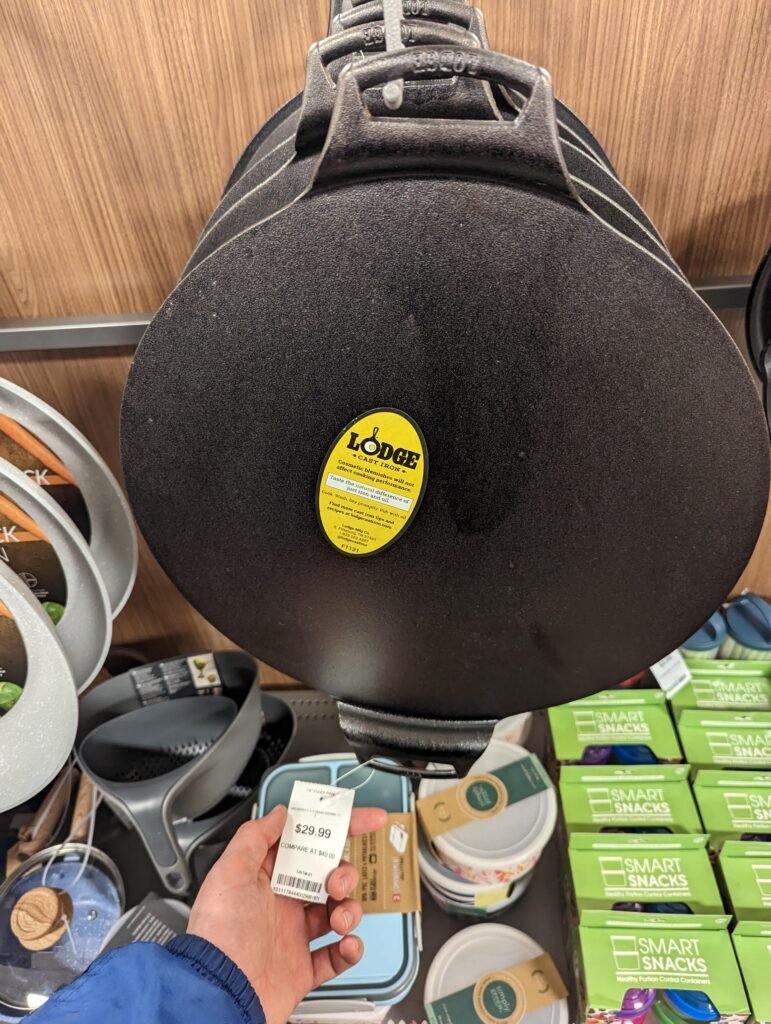Pizza Stone vs Cast Iron: Comparing these two popular cooking tools can help you choose the best one for your needs. Both options have unique features that can enhance your pizza-making experience.
When it comes to making the perfect pizza, the right equipment is essential. Pizza stones and cast iron pans are two top choices among home cooks and chefs. Pizza stones are known for their ability to evenly distribute heat, creating a crispy crust.
Cast iron pans, on the other hand, offer versatility and excellent heat retention. Understanding the benefits and drawbacks of each can help you make an informed decision. Whether you prefer a traditional crispy crust or a deep-dish delight, this comparison will guide you in selecting the best tool for your kitchen.
Pizza Stone Basics
Pizza stones are popular tools for baking pizza at home. They help achieve a crispy crust, similar to a traditional pizzeria. But what makes them so effective?
Let’s dive into the basics of pizza stones. We’ll look at their material and construction, and their heat retention properties.
Material And Construction
Pizza stones are usually made from ceramic or cordierite. These materials can handle high temperatures without cracking. The surface of the pizza stone is porous. This helps absorb moisture from the pizza dough, creating a crisp crust.
Some pizza stones are thicker than others. Thicker stones take longer to heat up. But they hold heat better. Thin stones heat up fast but may not retain heat as well.
Heat Retention
Heat retention is a key feature of pizza stones. They need to be preheated in the oven for at least 30 minutes. This ensures they reach the right temperature. A well-heated pizza stone cooks pizza evenly.
The stone absorbs heat and transfers it to the pizza dough. This mimics the effect of a brick oven. The high heat helps the dough rise quickly. This creates a light and airy crust.
In summary, a pizza stone’s material and heat retention are crucial. They ensure you get a delicious, crispy pizza every time.
Cast Iron Basics
Cast iron has been a favorite in kitchens for years. Its strong build and versatile use make it popular. Many pizza enthusiasts prefer cast iron for their baking needs.
Material And Durability
Cast iron is known for its toughness. It can last a lifetime if cared for properly. Its heavy weight helps in retaining heat, which is perfect for making pizzas. Cast iron can withstand high temperatures, making it great for ovens and grills. This material does not chip or crack easily.
Seasoning cast iron creates a natural non-stick surface. This process involves coating it with oil and heating it. Over time, this layer builds up and enhances its durability.
Heat Distribution
Cast iron distributes heat evenly across its surface. This ensures that the pizza cooks uniformly. No hot or cold spots. Consistent heat is crucial for a well-cooked crust. Cast iron retains heat longer than other materials. Once heated, it stays hot for a longer period. This helps in achieving a crispy crust.
Even heat distribution means fewer chances of burnt spots. Your pizza comes out perfectly cooked every time.
Cooking Performance
Pizza stones create a crispy crust by evenly distributing heat. Cast iron skillets, on the other hand, provide excellent heat retention. Both options offer unique cooking benefits.
Cooking performance is often the deciding factor when choosing between a pizza stone and a cast iron for your homemade pizza. The way your pizza cooks, the texture of the crust, and the overall cooking time can vary significantly depending on the material you use. Let’s break down the differences.Crust Texture
The crust is the foundation of any great pizza. A pizza stone absorbs moisture from the dough, creating a crisp and airy crust. You might notice those lovely little air bubbles that make each bite delightful. Cast iron, on the other hand, retains heat exceptionally well. This results in a crust that’s crispy on the outside but chewy inside. Think of it as the perfect balance between texture and flavor. If you love a crunchy crust, you might prefer the pizza stone. If a slightly chewy center is your thing, cast iron could be your best friend.Cooking Time
Time is of the essence when you’re hungry. Pizza stones generally take longer to preheat. You’ll need at least 30 minutes to get it hot enough for cooking. But once it’s hot, it cooks your pizza quickly and evenly. Cast iron heats up faster and retains that heat. This means your pizza cooks more quickly, often in under 10 minutes. It’s perfect for those busy weeknights when you need dinner on the table fast. Consider your schedule. Do you have time to let a pizza stone preheat, or do you need the efficiency of cast iron? Choosing between a pizza stone and cast iron depends on your priorities. Do you want that perfect crust texture or a quicker cooking time? Have you tried both methods, and which did you prefer? Your personal experience can guide you to the best choice for your kitchen.
Versatility
Both pizza stones and cast iron offer versatility in cooking. Pizza stones provide even heat distribution, while cast iron retains heat well and can be used for various dishes. Each has unique benefits, making them valuable tools in the kitchen.
Choosing between a pizza stone and cast iron can be tough. Both are versatile kitchen tools. They each have unique uses beyond just making pizza. Let’s explore their versatility.Other Uses For Pizza Stones
Pizza stones are not just for pizza. You can bake bread on them. The stone helps create a crispy crust. It also retains heat evenly. This means your bread cooks well. Roasting vegetables on a pizza stone works great too. The high heat makes the vegetables crispy. You can also use it to heat frozen foods. Pizza stones are durable and easy to clean.Other Uses For Cast Iron
Cast iron is incredibly versatile. You can cook almost anything in it. Sear steaks to perfection. The pan gets very hot and holds heat well. This creates a beautiful crust on the meat. Bake cornbread or other baked goods in cast iron. The heat distribution is even. You can also sauté vegetables. They cook quickly and evenly. Cast iron skillets are easy to maintain. They get better with age. Keep them seasoned, and they last forever. “`Maintenance And Care
Caring for a pizza stone involves gentle cleaning and avoiding soap. Cast iron requires seasoning and regular oiling to prevent rust. Both need proper storage to maintain their durability.
### Maintenance and Care Maintaining your pizza stone or cast iron can seem like a daunting task, but it’s crucial for the longevity and performance of your cooking tools. Proper care ensures that your equipment remains in top shape, leading to consistently delicious homemade pizzas. Let’s dive into the specifics of how to clean and care for both pizza stones and cast iron.Cleaning Pizza Stones
Pizza stones can be tricky to clean. You can’t just throw them in the dishwasher. They require a more hands-on approach. Start by letting the pizza stone cool completely. Never submerge it in cold water while it’s hot, as this can cause it to crack. Once cool, use a plastic scraper or spatula to remove any leftover food. Avoid using metal tools as they can scratch the surface. For stubborn spots, make a paste with baking soda and water. Apply it gently with a soft cloth. Rinse with water and let it dry completely before the next use. Avoid using soap or detergents. The stone is porous and can absorb these chemicals, affecting the taste of your pizza.Cleaning Cast Iron
Cleaning cast iron requires a different approach but is equally important for maintaining its non-stick surface. After cooking, let the cast iron cool slightly but not completely. This makes it easier to clean off food residues. Use a stiff brush or sponge with hot water to scrub the surface. Avoid using soap as it can strip the seasoning off the cast iron. For tough spots, use coarse salt as an abrasive. Rub it in with a paper towel or cloth, then rinse with water. Dry the cast iron thoroughly with a towel. To prevent rust, heat it on the stove for a few minutes to ensure it’s completely dry. Apply a thin layer of oil to the surface and wipe off any excess with a paper towel. This helps maintain the seasoning. ### Final Thoughts Taking the time to properly maintain your pizza stone and cast iron can drastically improve your cooking experience. Have you ever noticed a difference in your pizzas when you properly care for your tools? What other tips do you swear by for maintaining your kitchen equipment? Your insights could be the key to someone else’s perfect pizza night.
Cost And Affordability
When it comes to choosing between a pizza stone and cast iron for your homemade pizza needs, cost and affordability are crucial factors to consider. You want to know how much you’ll be spending and whether it’s worth the investment. This section breaks down the price ranges for both pizza stones and cast iron, helping you make an informed decision.
Price Range Of Pizza Stones
Pizza stones can vary in price depending on material, brand, and size. Basic ceramic pizza stones start around $20, making them a budget-friendly option for beginners.
If you’re looking for a more durable option, cordierite pizza stones are available, usually ranging from $30 to $60. These stones are designed to withstand high temperatures and offer better heat distribution.
Top-of-the-line pizza stones made from baking steel can cost upwards of $80 to $100. These are ideal for serious pizza enthusiasts looking for professional-quality results at home.
Price Range Of Cast Iron
Cast iron pans, known for their versatility, also come in a range of prices. You can find a basic cast iron skillet for as low as $15. These are great for those just starting out or on a tight budget.
Mid-range options, which often include additional features like pre-seasoning and ergonomic handles, typically cost between $25 and $50. These pans offer a good balance of quality and affordability.
High-end cast iron pans can cost anywhere from $60 to $100 or more. These often come from reputable brands and are built to last for generations, making them a worthwhile investment for your kitchen.
Have you considered how often you’ll use your pizza-making tool? Frequent use might justify a higher upfront cost. For occasional use, a budget-friendly option might be just fine.
Ultimately, the choice between a pizza stone and cast iron comes down to your needs, preferences, and budget. By understanding the cost and affordability of each, you can make a decision that best fits your lifestyle and pizza-making ambitions.
User Experience
When it comes to making pizza at home, the user experience can vary greatly depending on whether you use a pizza stone or a cast iron skillet. Each has its unique characteristics that can affect your pizza-making journey. Let’s dive into the specifics of how each one feels to use.
Ease Of Use
Pizza stones are straightforward. You simply place them in the oven and preheat. They retain heat well, providing an even cooking surface.
However, they can be heavy and fragile. Dropping one could mean an expensive mess.
On the other hand, cast iron skillets are durable and versatile. You can use them on the stovetop or in the oven.
But they do require seasoning to maintain their non-stick surface. This can be a bit of extra work compared to the simplicity of a pizza stone.
Common User Preferences
Many users prefer pizza stones for their ability to mimic a traditional pizza oven. The stone’s porous nature absorbs moisture, giving you a crispier crust.
Cast iron, while versatile, offers a different experience. It provides a deep, evenly cooked crust, ideal for those who like a bit more substance.
Some users enjoy the rustic, hands-on feel of a cast iron skillet. They appreciate its multi-functional use in the kitchen.
What about you? Do you value the simplicity and crispy results of a pizza stone, or the durability and versatility of a cast iron skillet?
Considering these factors can help you decide which one fits your pizza-making style best. Both have their merits, but the right choice depends on what you value in your cooking experience.

Frequently Asked Questions
Is It Better To Cook Pizza On Stone Or Cast Iron?
Cooking pizza on a stone ensures a crispier crust. Cast iron provides even heat and a slightly softer crust. Both are good options.
What Is The Best Material To Cook Pizza On?
The best material to cook pizza on is a pizza stone. It provides even heat, resulting in a crispy crust.
Can Cast Iron Be Used For Pizza?
Yes, cast iron can be used for pizza. It provides even heat distribution, ensuring a crispy crust. Preheat the skillet for best results.
Does A Pizza Stone Really Make A Difference?
Yes, a pizza stone makes a difference. It ensures even heat distribution, resulting in a crispier crust and better-tasting pizza.
Conclusion
Choosing between a pizza stone and cast iron depends on your needs. Pizza stones offer even heat for crispy crusts. Cast iron provides versatility and durability. Both tools can elevate your homemade pizzas. Consider your cooking style and preferences. Either option will enhance your pizza-making experience.
Enjoy delicious pizzas at home with the right tool. Happy cooking!


